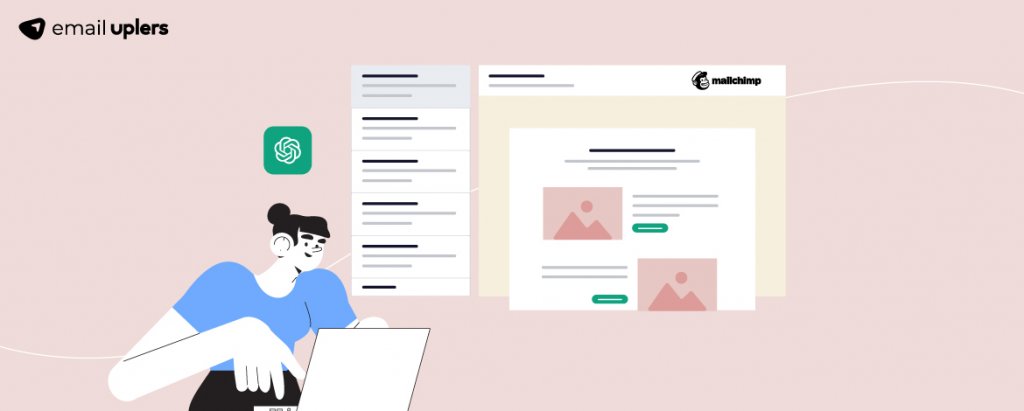The Siamese conflation of marketing and AI technology is at the forefront of business operations today. Businesses need to integrate various tools and technologies into their processes to “automate, streamline, and optimize” their marketing projects.
Mailchimp, one of the leading marketing automation and email marketing platforms, can do wonders for your business in tandem with ChatGPT. Being Mailchimp email experts ourselves and having delivered tangible results for our clientele across the board, we can more than vouch for the platform’s wherewithal in relation to integration.
In this guide, we will learn how to integrate ChatGPT into Mailchimp so that you can lubricate the cogs of email marketing and deliver frictionless customer experiences. As a bonus, we will also be exploring Mailchimp’s rendezvous with AI. So, on with the motley!
1. Generate API Keys
To set the ball rolling, you need to first generate API keys for both ChatGPT and Mailchimp. To obtain the API key for ChatGPT, follow these steps:
- Visit the Open AI platform. Navigate to the sidebar, and select API keys as shown below.
- Click API keys and create a new secret key, as shown in the following image. (You may be asked to verify your phone number first.)
Now, follow these steps to obtain the API key for Mailchimp.
- Log in to your Mailchimp account. Go to the Account page.
- Click the Extras tab and choose API keys as shown here.
- Click Create A Key. Then copy the generated API key.
2. Set up A Dev Environment
Now, you need to set up a development environment. It’s a safe workspace for developers to make necessary changes without upsetting anything in the live environment.
You can use any programming language of your choice. We will be using Python. So we have pip already installed. Now, we will install requests and mail_chimp packages.
3. Create Email on ChatGPT
Now, we will generate email content using the API key for ChatGPT. Feel free to use the following Python script. Remember to replace YOUR_UNIQUE_API_KEY with your actual key.
4. Send an Email on Mailchimp
Now, we will use Mailchimp’s API key. Take a good look at the following Python script. Once again, replace the API key and the list ID with your unique values.
5. Tacking It Together
You are almost done. Now, you can use both functions in a single Python script, as shown below. We want to generate email content in ChatGPT and then send it in Mailchimp.
Reinforcing The Integration
Now that you know how to apply the integration, you would need to reinforce it by importing more advanced features and functionalities, such as audience segmentation and personalization, from both ChatGPT and Mailchimp.
For instance, in the case of personalization, you can add relevant tokens to ChatGPT prompts. The most obvious one would be {first_name}.
You can then leverage Mailchimp’s native segmentation tools to create uber-targeted campaigns.
For each segment, you can generate unique ChatGPT prompts and send the right message to the right people.
Another instance could be A/B testing. You can implement it in your Python script once you create multiple campaigns with different subject lines (or any other variable you choose to test). You can then pick the winner from Mailchimp’s reports.
Mailchimp’s Rendezvous with AI
Ever since the advent of AI, Mailchimp’s team has been quick to adopt it and leverage it to expand the potential of the platform. It all began with Mailchimp’s acquisition of the automated design platform, Sawa, in 2019. Following this, Mailchimp acquired Inspector 6 in 2020 to help brands create “more effective marketing content.”
Today, Mailchimp boasts more than 20 “AI and data science features in-app.” Mailchimp’s stated goal is to enable marketers to save time, build and deliver more effective marketing campaigns, and transfer data-driven insights to their collective decision-making.
Of course, generative AI plays a big role in making all this possible. As Jon Fasoli, Chief Design and Product Officer at Mailchimp, puts it, “We see generative AI fundamentally changing the landscape of creative work, and we’re here to help our customers apply it to their day-to-day marketing in meaningful ways so that they get more done and reach their goals faster.”
From Send Day and Time Optimization, Content Optimization, and Alt-text Generation to Journey Builder Recommendations, Stock Image Suggestions, and Product Recommendations, Mailchimp’s AI-powered Email Content Generator is an all-in-one unraveling of the potential of email marketing combined with AI.
To illustrate how ambitious Mailchimp is toward leveraging gen AI, in February 2023, the brand utilized ChatGPT to deliver minute-by-minute highlights of a game at the Super Bowl.
Christened “Play by AI,” Mailchimp aimed to give fans an “AI-generated, live tweeting experience.”
Jeremy Jones, Group Creative Director of Advertising at Mailchimp, says, “Culture is made in an instant at the Super Bowl, but for marketers who want to capitalize on it, all the noise can feel overwhelming. That’s why Mailchimp—a marketing platform that markets to marketers—created Play by AI to highlight the fun and practical ways AI can help generate compelling and effective content for email and beyond.”
The point of it all is partly to emphasize Mailchimp’s commitment to AI and partly to reassure marketers. Mailchimp has put their money where their mouth is. With time, we can expect them to announce more such fraternizing with AI – all ultimately for the benefit of businesses, small and large.
Wrapping Up!
AI-powered digital marketing is all the rage, and not for nothing. More and more businesses are starting to realize its potential in transforming how they can traverse the customer-scape across multiple touchpoints. Speaking of AI-integrated email, it is one of the more dynamic offshoots of the industry-wide revolution.
With Mailchimp’s well-attested integration capabilities, coupled with ChatGPT’s globally celebrated utility, your next email campaign enjoys all the necessary ingredients to succeed.
